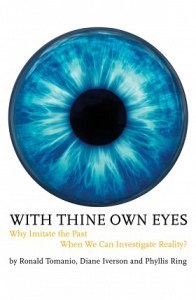Phyllis Edgerly Ring's Blog, page 25
July 20, 2015
The unknown’s hidden kinship
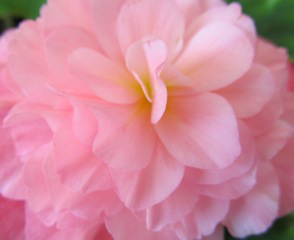
Photo: https://www.etsy.com/shop/DKirkupDesigns
When I was young, I had to choose between the life of being and the life of doing. And I leapt at the latter like a trout to a fly.
But each deed you do, each act, binds you to itself and to its consequences, and makes you act again and yet again.
Then very seldom do you come upon a space, a time like this, between act and act, when you may stop and simply be.
Or wonder who, after all, you are.
~ Ursula K. Le Guin
Wise insight from experienced writers like Ursula K. LeGuin helps shift my inner compass toward that grace of the space and time between, so I can discover, yet again, what it holds. Without exception, the mystery of this unknown offers me, like the source of a stream, the place from which creative expression flows.
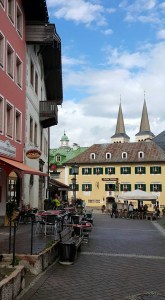
Photo: David Campbell / GBC Tours
“I have been a storyteller since the beginning of my life, rearranging facts in order to make them more significant,” John Cheever said. My own earliest play involved arranging miniature objects on the floor of my childhood bedroom to create scenes, often like the ones I saw around me in Germany, then adding the characters and conversations I knew somewhere inside me. I’m told that some of these exchanges were occasionally audible when I was 3, 4, or 5. After that, I probably grew too self-conscious to allow that to happen.
For me, Cheever’s “more significant” would, initially, have meant interesting for me. Today, it has grown to mean significant for my heart, with evidence of a soul’s transcendence over the small side of human being. That’s the only way that story — either others’ or my own — can ever attract me, and is the treasure I’m always searching for. It’s what I believe story, in its highest purpose, has always been for.
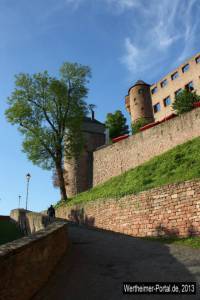
Photo: http://www.wertheimerportal.de/
This makes the bringing forth of story a sacred thing for me, as well as a search that requires the surrender Le Guin points to, one woven with a willing sense of wonder.
“Wonder makes the unknown interesting, attractive, and miraculous. A sense of wonder helps awaken the hidden affinity and kinship which the unknown has with us,” John O’Donohue describes in Eternal Echoes.
““What we write today slipped into our soul some other day when we were alone and doing nothing,” writer Brenda Ueland has reminded.
Ah, the sweetness of this truth, whose admission price is that space and time between — beyond the insistent, nonstop doing that life — and we — so often try to impose. The experience of writing requires that I seek refuge from that clamor and feel my inner life slow down to presence once more.
In an interview with Karen Bouris of Original Story, novelist Elizabeth Gilbert said:

Image: EnochVision.com
“I think creativity is entirely a spiritual practice. It has defined my entire life to think of it that way. When I hear the way some people speak about their work, people who are in creative fields who either attack themselves, or attack their work, or treat it as a burden rather than a blessing, or treat it as something that needs to be fought and defeated and beaten. . . . There is a war that people go to with their creative path that is very unfamiliar to me. To me, it feels like a holy calling and one that I am grateful for.
… I was given a contract, and the contract is: ‘We are not going to tell you why, but we gave you this capacity. Your side of the contract is that you must devote yourself to this in the highest possible manner, you must approach it with the greatest respect, and you must give your whole self to this. And then we will work with you on making progress.’ That’s sort of what it feels like for me.”
What good companionship I find here, as she speaks for my own heart.
The entire interview can be seen at http://www.dailygood.org/view.php?sid=413


July 17, 2015
Patience a key on the soul’s map

Photo: https://www.etsy.com/shop/DKirkupDesigns
It was a turning point when I realized that patience isn’t something I “should” cultivate or practice, but a bearer of grace and mystery that deserves to be warmly welcomed into my life.
More things require — demand — it in my days now. Much like the better-informed choices that can help preserve my physical well-being, patience is too vital a resource to overlook in these rapidly changing days.
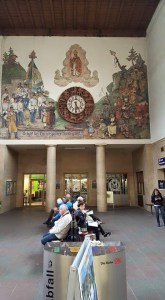
Photo: David Campbell / GBC Tours
When I open to patience like a flower, receive its remedy, and practice restraint with tendencies that want to trample it underfoot, I feel untouched by those things what could become stressors and irritants. Eventually, many of them stop hitting my inner radar screen at all, which suggests that, without patience, those previously mentioned tendencies actually go looking for unhelpful things. Patience is a key that opens a door that leads beyond them.
Of course, intercepting those tendencies often leads to encountering feelings, ones that the tendencies seem determined to avoid. That’s when I remember that patience, when welcomed like a kind, benevolent friend, rekindles something I love very much: a quiet, steady believing feeling that things are going to turn out as they need to, and all is well. The whole experience of living feels reassuring. Soul-sized, from a liberating overall perspective, rather than the ruts those old tendencies of mental habit might drag me through. They won’t stop trying to drag me there, but I don’t have to go.

Photo courtesy David Campbell
Recently, someone who works hard, does a lot to help others, and has challenges, just like the rest of us, stood beside me and breathed, “I have a good life.” It was like a blessing. It definitely felt like words that come from the other side of that door that patience, with its resulting assurance, invites us through.
John O’Donohue expressed this kind reality beautifully:
“The soul knows the geography of your destiny. Your soul alone has the map of your future, therefore you can trust this indirect, oblique side of yourself. If you do, it will take you where you need to go, but more important it will teach you a kindness of rhythm in your journey.”
July 14, 2015
Accepting the pace life wants

Photo: http://www.hopefield.org.uk/adopt-ned-the-donkey/
Sometimes, as one friend has described, we’re simply “riding the donkey”.
Decades ago, this was how one got from one place to the next and in many places, it still is. It could be tedious. It can be tiresome, taxing of heart and testing of patience — even of confidence and faith, when the going is especially slow.
Eventually, inevitably we all face such biding and abiding (ask any pregnant mother). Ideally, we make peace with it, yield to receiving what it brings – what our own ideas and designs often chafe against.
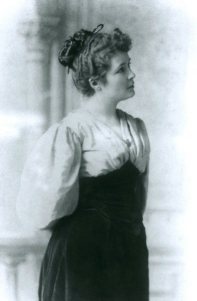 A heroine of mine, Marion Jack, learned a lot about this. When I need inspiration for staying the course, going the distance, perhaps when I most want to quit, I remember what her life demonstrates about accepting this price of some of life’s most valuable outcomes, even though our urge may be to flee, dodge, or fight.
A heroine of mine, Marion Jack, learned a lot about this. When I need inspiration for staying the course, going the distance, perhaps when I most want to quit, I remember what her life demonstrates about accepting this price of some of life’s most valuable outcomes, even though our urge may be to flee, dodge, or fight.
Marion stayed the course, consciously, willingly in very trying times, and places. One was Nazi-occupied, and filled with treachery. She could have left – she had opportunity. She chose to stay for others’ sake, and for commitments she’d made.
“As I have the capacity of suffering much, so I also enjoy much,” she once observed. She also noted with real pleasure, “It seems wonderful, what one can do without.”
Other words of hers hit close to home: “Each one has his own little work to fill in the great scheme of things. Mine seems to be to work quietly in new fields or in assisting the real [workers]. So I always think it wisest to try and do one’s own work and not think of attempting the line of other people.”
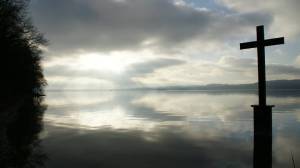
Photo: David Campbell / GBC Tours
She was well-experienced with riding life’s donkey. I imagine her as thankful for the steps it covered on her behalf, however much the movement may have sometimes seemed backward. Or, at best, like treading in place.
She didn’t forget that, whatever circumstances felt like around her, she was being carried, moved — even led. And no matter what she could or could not see, things were advancing.
Often, the biggest of those was love, just as the real means of their advance was love, too. She knew from experience that the pace that took, even when it resembled a donkey’s, was always exactly right.


July 11, 2015
Not for ourselves alone
A little feast of gleanings
about the divine details of beauty and creative spirit:
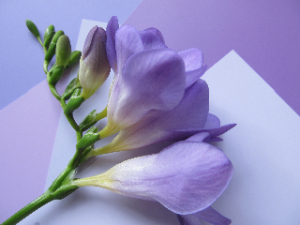
Photo: https://www.etsy.com/shop/DKirkupDesigns
No synonym for God is so perfect as beauty.
~ John Muir
Not for ourselves alone but for the whole world are we born.
~ John A. T. Robinson
What we take in by contemplation, we must pour out in love.
~ Meister Eckhart
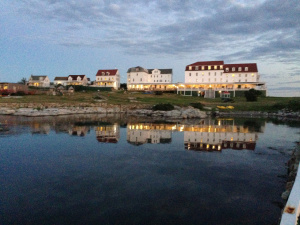
Photo: Jon Ring
Everything important has already been said. But no one was listening, so it must be said again.
~ Andre Gide
Art calls for complete mastery of techniques, developed by reflection within the soul
~ Bruce Lee
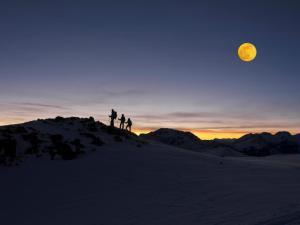
Photo: David Campbell / GBC Tours
In the realm of ideas everything depends on enthusiasm … in the real world all rests on perseverance.
~ Johann Wolfgang von Goethe
The most important thing about art is to work. Nothing else matters except sitting down every day and trying.
~ Steven Pressfield


July 8, 2015
What is preserved and never lost
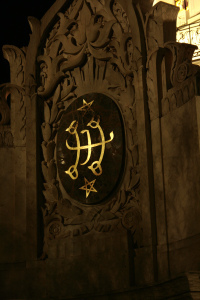 The week brings a very special day for Bahá’ís around the world as we remember The Báb.
The week brings a very special day for Bahá’ís around the world as we remember The Báb.
His life and the spiritual revolution in its story was my first encounter with the Revelation of the Bahá’í Faith.
From those earliest days, these words of The Báb’s have traveled with my grateful heart: 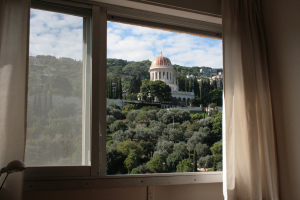
“O peoples of the world! Whatsoever ye have offered up in the way of the One True God, ye shall indeed find preserved by God, the Preserver, intact at God’s Holy Gate.”
Every sparrow, every hair of our head, every feather and seed and blade of grass is accounted for. And every wish of our heart.
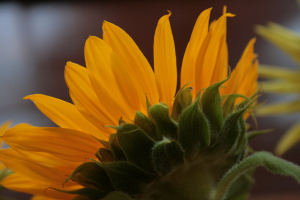 Imagine the real spiritual presence of each one of our willing efforts and actions.
Imagine the real spiritual presence of each one of our willing efforts and actions.
It can be easy to feel dismayed by the world as we see it around us.
But the building of the good is what is preserved — the increase and advance of love in the coming forth of what is of God.
Photos courtesy of Nelson Ashberger and Saffron Moser.


July 6, 2015
The true joy of every soul
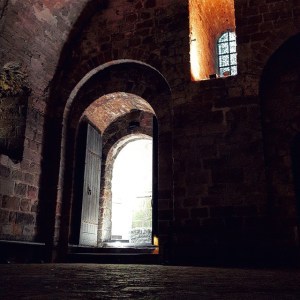
All Photos: David Campbell / GBCTours – https://www.facebook.com/GBCtours?pnref=about.overview
The world is in travail, its agitation boiling over as chaos and confusion increase daily, even hourly. Some days, I barely get my eyes open before the spectre of these assails my inner and outer senses.
Thankfully, many of us recognize this time of immense transition for our human family, this new stage of inner evolution we’re being summoned to. I could say “invited”, but I must remind myself that, whether or not I accept, the big event is going to happen, with or without me.
If left to the limits of my human nature, I would surely be in despair. I would live there, like a permanent address.
“The true joy of every soul is the realization of the divine Spirit,” says Inayat Khan. “Absence of realization keeps the soul in despair.” ‘Abdu’l-Bahá offers an observation that is particularly timely about this process of realization:
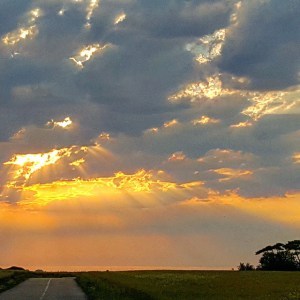
Photo: David Campbell / GBCTours
“When woman’s point of view receives due consideration and woman’s will is allowed adequate expression in the arrangement of social affairs, we may expect great advancement in matters which have often be grievously neglected under the old regime of male dominance — such matters as health, temperance, peace, and regard for the value of the individual life. Improvements in these respects will have very far-reaching and beneficent effects.”
What remedies lie waiting if we give such due consideration and allow such adequate expression? How does it FEEL, within us, to contemplate what it means to be “grievously neglected”? And what curious term did ‘Abdu’l-Bahá choose to describe something grossly imbalanced that has ceased to provide benefit and, quite often, causes harm? He calls it a “regime”.
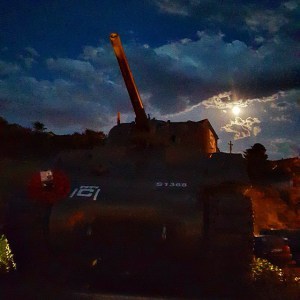
Photo: David Campbell / GBCTours
What has any of this to do with my own choices, perception, and thoughts — the powers of my own birthright? It’s so much easier to read a passage like this and feel pulled downward, toward hopelessness, or outward, to make judgments about current conditions and others’ behavior.
Yet what keys do the things ‘Abdu’l-Bahá identifies here hold for the “realization of the divine Spirit”? He also said: “The world in the past has been ruled by force, and man has dominated over woman by reason of his more forceful and aggressive qualities both of body and mind. But the balance is already shifting; force is losing its dominance, and mental alertness, intuition, and the spiritual qualities of love and service, in which woman is strong, are gaining ascendancy. Hence the new age will be an age less masculine and more permeated with the feminine ideals, or, to speak more exactly, will be an age in which the masculine and feminine elements of civilization will be more evenly balanced.”
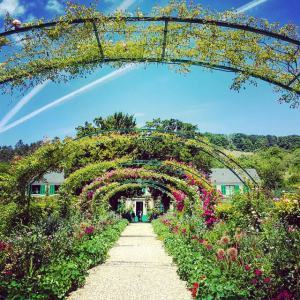
Photo: David Campbell / GBCTours
As he points to the bright possibility of this balance, ‘Abdu’l-Bahá is saying that the regime of dominance, which has ruled with force, is losing that dominance. Two questions that immediately come to mind are: Do I believe that?” and “How am I working in harmony with that reality?” Other considerations might include: “Are there ways that I still resist that liberating truth — or in which I prop up that obsolete regime?”
As travail, chaos, and confusion escalate, even engulf our world, I can recognize the effective remedy that awaits me, and the world, in the qualities described here. Of course, part of the paradox is how much the social conditioning of that “old regime” degrades these very qualities, even seeks to destroy them, when it can’t co-opt them for its own self-serving agenda, most of which doesn’t sustain life, but imperils it.
The delightfully good news is that these qualities ‘Abdu’l-Bahá names are unlimited, and indestructible. Unlike that regime.
What does a world in which “mental alertness, intuition, and the spiritual qualities of love and service” are valued — even prized — look like? Feel like? In the midst of any noisy, confused chaos, I can look for and discover this in myself and others, every day.


July 3, 2015
For whom the bell did not toll
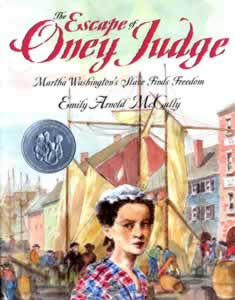
A wonderful resource about Ona Judge.
Though she spent the greater part of her life in my home state of New Hampshire, Ona Judge lived literally in the shadow the Liberty Bell in Philadelphia – without one morsel of the freedom it has come to represent.
Now the Liberty Bell itself has a history full of irony. When it first arrived from where it had been cast in London and was hung outside the Pennsylvania State House to test its sound, it cracked at the stroke of its own clapper, a rather inauspicious sign. Tradition maintains that it was tolled in 1774 to declare the inauguration of the First Continental Congress. Abolitionist newspaperman William Lloyd Garrison coined the name “Liberty Bell” to describe it when it was used as a symbol in an 1839 pamphlet produced by the American Anti-Slavery Society.
Although the bell had been recast after it cracked, a second crack occurred that required it to be repaired yet again in 1846. Perhaps days later, the bell was rung for several hours in honor of George Washington’s birthday. It was during that time that a crack advanced from the top of the repaired crack to the crown, and the bell was rendered unusable. 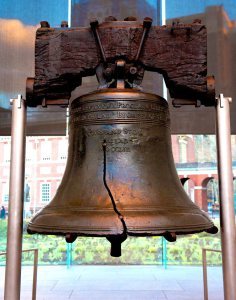
A venerable part of the nation’s history all the same, the bell was removed from its tower in 1852 and displayed to the public in a variety of locations, the most recent, and presumably final, the Liberty Bell Center pavilion in Philadelphia, just south of where George Washington had lived in the 1790s. At that time, this home was the equivalent of the White House, which had yet to be built in what was then the wilderness of the future District of Columbia.
During the design and construction of the bell’s display pavilion, planners discovered that the site was adjacent to the living quarters of black people who’d been enslaved – ones owned by the “Father of Our Country.” And, it turned out, visitors to the Liberty Bell were accessing the bell by walking directly over the quarters where the home’s slaves had been housed.
Among those enslaved servants was Ona Judge, hopefully a figure who will one day have name-recognition for every American school child, well beyond the prodigious hilltops of New Hampshire. Hers is a tale of how a black woman challenged and bested her “master,” who also happened to be the leader of the nation.
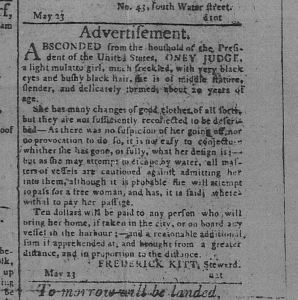 “Born into” the slave-holdings of Martha Washington, Ona had become a famous face herself, one often seen at the many grand events Martha hosted, and which Ona’s arduous workdays made possible. At the age of 15, Ona had already had one wrenching parting from all of those she knew and loved when she was one of seven slaves to leave Mount Vernon and accompany the First Family to its new Philadelphia executive residence.
“Born into” the slave-holdings of Martha Washington, Ona had become a famous face herself, one often seen at the many grand events Martha hosted, and which Ona’s arduous workdays made possible. At the age of 15, Ona had already had one wrenching parting from all of those she knew and loved when she was one of seven slaves to leave Mount Vernon and accompany the First Family to its new Philadelphia executive residence.
Small surprise that, when Martha announced her intention a few years later to bestow Ona as a wedding gift upon her granddaughter, Ona, whose trustworthiness and good service facilitated her coming and going freely in Philadelphia, simply walked out the front door while the family was eating dinner. Uneventful as it was, this escape would have brought severe penalties had she been caught.
Heaven knows what pluck and resourcefulness helped her get all the way to Portsmouth, NH, where she was promptly recognized on the street by the daughter of Senator John Langdon, as the Langdons knew the Washingtons very well. Ironically, although in covert ways, it would be Langdon who would help Ona keep her freedom by ensuring she had sufficient warning whenever Washington’s appointed agents came to find her.
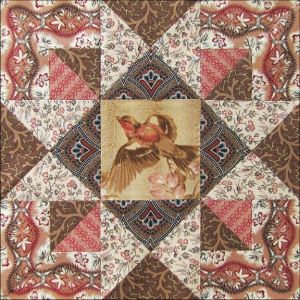
Excellent info. about Ona Judge and history of her times: http://civilwarquilts.blogspot.com/2014/01/threads-of-memory-1-portsmouth-star-for.html
Ona made a life for herself as a free black, even as she knew that slave-hunters could appear at any time to seize her, along with any children she might have, and she’d have no recourse at all. “Mistress of her needle,” as Washington himself had called her, she found a work as a seamstress and married a Black sailor, Jack Staines, and the couple had three children.
Some years later, after his retirement from the Presidency, Washington – no doubt at the chiding insistence of an outraged Martha, said to be the stronger personality of the two – dispatched yet another hunter, his nephew, Burwell Bassett, Jr., to try and fetch Ona back. One again, John Langdon’s intervention helped warn her in advance.
Although Ona died a ward of the state in her own home in 1848, having outlived her children, the citizens in her small community of Greenland, NH, cared about her enough to help keep her stocked with essentials. Her life as a free woman was unquestionably more difficult, in terms of material comforts than it would have been had she stayed with the Washingtons.
More than once, she was asked how she could relinquish the “silks and satins” of that “fine way of life” she had known for inevitable poverty. Her reply: “I am free, and have, I trust, been made a child of God by the means.”
It seems it was richness in spirit she was after, and the real freedom the Liberty Bell had come to symbolize: the ability to read and learn, to worship as she chose; and to spend the hours of her time as she, herself, determined to.
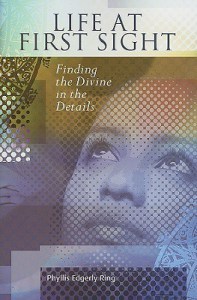 I wonder how history will come to view and redefine the kind of liberty that’s been symbolized by a bell that lost its voice, and a woman who found hers, and sounded the bell of her own freedom?
I wonder how history will come to view and redefine the kind of liberty that’s been symbolized by a bell that lost its voice, and a woman who found hers, and sounded the bell of her own freedom?
Adapted from Life at First Sight: Finding the Divine in the Details: http://www.amazon.com/Life-First-Sight-Finding-Details-ebook/dp/B00B5MR9B0/ref=tmm_kin_swatch_0?_encoding=UTF8&sr=&qid=


June 30, 2015
In the soul’s secret symmetry
Gleanings found here and there:
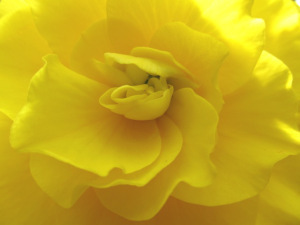
Photo: https://www.etsy.com/shop/DKirkupDesigns
Love gives life to the lifeless. Love lights a flame in the heart that is cold. Love brings hope to the hopeless and gladdens the hearts of the sorrowful. In the world of existence there is indeed no greater power than the power of love.
~ ’Abdu’l-Bahá
Today, like every other day, we wake up empty
and scared. Don’t open the door to the study
and begin reading. Take down a musical instrument.
Let the beauty we love be what we do.
There are hundreds of ways to kneel and kiss the earth.

Photo: https://www.etsy.com/shop/DKirkupDesigns
~ Rumi
O God! Prepare for us all those things which are the cause of unity and accord! O God! Descend upon us Heavenly Fragrance and change this gathering into a gathering of Heaven! Grant to us every benefit and every food. Prepare for us the Food of Love! Give us the Food of Knowledge! Bestow on us the Food of Heavenly Illumination!
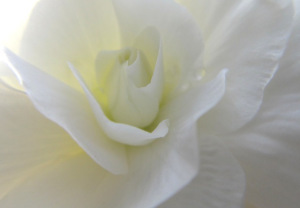
Photo: https://www.etsy.com/shop/DKirkupDesigns
~ ‘Abdu’l-Bahá
Take time to celebrate the quiet miracles that seek no attention.
Be consoled in the secret symmetry of your soul. May you experience each day as a sacred gift woven around the heart of wonder.
~ John O’Donohue


June 28, 2015
How love is trying to find us
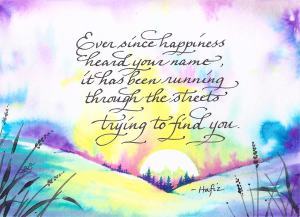
Image: http://www.nothingshortofjoy.com/
How does coming to understand who it is we are created to be change the way we see ourselves, each other, and our world?
Perhaps this understanding welcomes in a new way of thinking and perceiving that flows out of love and attraction toward the latent spiritual gifts in myself and others that are waiting to be revealed.
Do I remember that I can always choose this love and attraction over the kind of near-instinctual reactions that arise from a fear that’s rooted in the mind’s preoccupation with mortality and physical survival? That crippling fear has kept humanity, human thinking, and our greatest possibilities entrapped for eons.
I’m not going to survive physically forever, nor is anyone else. I wonder why that aspect of life receives so very much attention? Might it be that some believe that’s all there is? All that we are here for?
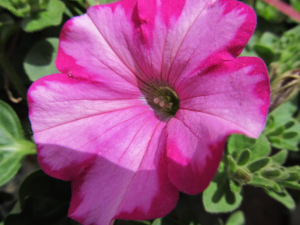
Photo: https://www.etsy.com/shop/DKirkupDesigns
Very possibly, however, we may have the chance to begin living in an eternal kind of way as we invite and employ what lasts forever – those gifts and qualities within us that await discovery, like gems in a mine.
“Only our spiritual nature can look beyond outward appearances, first impressions and personality flaws to see `all the virtues of the world of humanity latent within’ ourselves and each other,” I’m reminded. It’s this core part of my self that has the capacity to “perceive honor and nobility in every human being”, including this one who looks back from the mirror each day.
For the first time, the realization of human oneness, in reality, is within our grasp. And each of us is invited to discover our unique, true identity as a soul, as well as our unique purpose, and our unique way of solving problems as a part of what is one reality, whatever kinds of separations we may dream up or imagine.
“Happy are those who spend their days in gaining knowledge, in discovering the secrets of nature, and in penetrating the subtleties of pure truth,” ‘Abdu’l-Bahá has reminded in a book called Some Answered Questions.
Excerpted from With Thine Own Eyes: Why Imitate the Past When We Can Investigate Reality?
More information: http://www.amazon.com/With-Thine-Own-Eyes-Investigate-ebook/dp/B00I1JPC7I/ref=pd_sim_kstore_11?ie=UTF8&refRID=0TQC490J7FVBRTJWM70H
Print version at: http://www.bahairesources.com/with-thine-own-eyes.html


June 25, 2015
Snow for summer reading
Started my #summerreading list #relaxing weekend! @phyllisring book topped the list Loved “Snow Fence Road”pick it up pic.twitter.com/kJ86VHVDIc
— Change Your Mind (@AnnieLudovici) May 26, 2015
So grateful to Annie Ludovici for such a very kind tweet about Snow Fence Road. Nothing boosts awareness of a book like personal appreciation and word of mouth.
So often, when a book is part of a giveaway at Goodreads, shipping the books off to winners is the last an author ever hears about it — until someone like winner Virgina Madrid does something mighty nice like this:
 Goodreads Review
Goodreads Review
5 of 5 stars
“A lovely romance novel that warms the heart!
Nice and classy with the touch of adventure that life offers.
I highly enjoyed this book.”
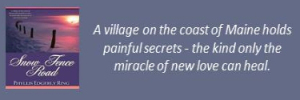
Adding a book to the world these days can feel like adding a leaf to a forest.
When folks make the time to journey into a book’s world, it is a supreme gift to its author.
I’m thankful for every reader willing to visit Knowle, Maine, and its ramshackle old Spinnaker Inn, then make time to let others know about it.

Join Night Owl Reviews’ Find Your Next Great Read Scavenger Hunt in June to discover great new books and authors, and maybe win an Amazon Gift Card: https://www.nightowlreviews.com/v5/Blog/Articles/Find-Your-Next-Great-Read-Scavenger-Hunt-June-2015
Find more about Snow Fence Road at:
http://www.amazon.com/Snow-Fence-Road-Phyllis-Edgerly/dp/1934912549/ref=sr_1_2?ie=UTF8&qid=1372083362&sr=8-2&keywords=Snow+Fence+Road+Phyllis+R





